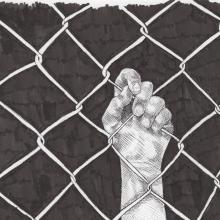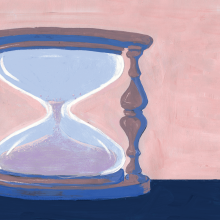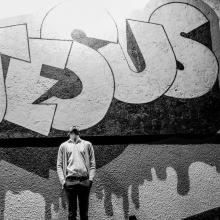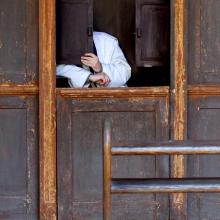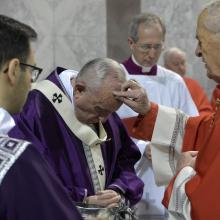Lent
Ash Wednesday 2020 marked a meat-free decade for me, a spiritual choice I made in 2010, just after I became engaged to a devout Hindu. What began as both a Lenten fast of solidarity and desperation — my husband is the cook, I am not — has held steady. A liturgical season turned into a year, then another and another. At each meal, I’ve made choice: Do I eat meat or not? Why or why not?
Isaiah 58 talks about a fast that loosens the bonds of wickedness. It undoes the straps of the heavy yokes that keep people oppressed and let them go free. It leads to food for the hungry, a home for the homeless, clothing for those without, and restores families. God says forthrightly, “This is the fast I desire."
WE'RE LIVING IN a fearful time, and 2020 has thus far served to amplify and validate many of our fears about the future of the nation, our faith, and the world. What’s at stake this year is perhaps a last chance to decisively reject the overt white nationalism that we’re up against, which is as bold and brazen as at any time in decades.
The racism that has been present in this land since before the founding of this nation, a nation built on the forced labor of kidnapped Africans and the displacement and genocide of Indigenous people, represents America’s original sin. The history of the U.S. is one of halting, tentative steps toward repenting of that sin, juxtaposed against white people doubling down on racist systems, structures, and beliefs. It’s important to note that repentance does not mean feeling bad or sorry but rather stopping, turning around, and going in a new direction. We are at a moment of national decision, between repentance on the one hand and active retreat from that progress on the other, meaning the reaffirmation and reinstitution of America’s original sin.
Lent is traditionally a time for deep reflection, often with prayer, fasting, study, and repentance. Given the crisis we are now facing in both nation and church, such deep Lenten reflection is urgently needed. Answering the questions that Jesus asked during his ministry, as I laid out my book Christ in Crisis, is the best response to our current political, moral, and religious crisis. It’s a response that could set us on a path toward true national repentance from America’s original sin.
Spiritual disciplines are always timeless, but they also can be powerfully timely in our personal and public lives. Many of us would say that the 2020 presidential election may be the most important in any of our lifetimes for the future of the country, and a sign of whether genuine and inclusive democracy in the United States even has a future. At the same time, calls for prayer, fasting, and repentance are centuries old — they continually demand that Christians go deeper in preparation to worship a risen Christ.
There is a type of question I get all the time, most recently during the book tour for Christ in Crisis: Why We Need to Reclaim Jesus. The questions that came from countless pastors and lay leaders in local churches was this: “What can I do as this political and spiritual crisis gets worse and worse? How do we even begin to respond to the enormous needs and stakes of this moment in American history and the future of Christianity in this country?"
Each spring Lent is a season on the church calendar, beginning on Ash Wednesday and concluding on Easter, which prepares Christians for Easter. The believer prepares his or her heart to celebrate Christ’s resurrection by embracing practices of prayer and repentance. An important part of experiencing Lent is walking through lament.
THE BOOK OF REVELATION is one of our companions this Eastertide. We are invited to contemplate its central image, the axis around which everything revolves: “the Lamb at the center of the throne” (7:17).
Is this an image that can engage the imaginations of our contemporaries, especially those unfamiliar with the scriptural symbolism? In 2016, I had my tattooist in New Zealand inscribe on the inside of my right forearm a striking copy of a medieval sculpture, one of the few that survive from the great Abbey of Cluny in France. It depicts the Lamb of God, bearing a cross. The Latin inscription surrounding it means, “As carved here the Lamb of God is small, but how great he is in heaven!”
I hadn’t anticipated that bearing this image on my body would lead to all sorts of intriguing conversations. Curious strangers stop me in checkout lines, bars, the beach, the street, asking, “What does that mean?” I talk about the vulnerability of God’s noncoercive love, and its ultimate power. Nothing can take away the sins of the world except the love that is revealed on the cross and vindicated in the resurrection. “Here is the Lamb of God that takes away the sins of the world!” (John 1:29).
Are these conversations sowing seeds of change? Only God knows. As for ourselves, we are still learning from the scripture’s insistence that the ultimate meaning of the Lamb is only accessible through adoration.
In our faith walk, there is much to celebrate, but insistently characterizing life as a triumphant march from glory to glory can alienate people who don’t find life quite as sunny. Church culture can feel painful for people who deal with various health issues or certain kinds of inner suffering that make it difficult to sense God’s presence. There’s little discussion in church of the “dark nights” that are a normal part of the faith journey, or the fact that such nights can last for years in some cases.
Timing is important. Sometimes timing is everything. That may be true now with the likely release of Special Counsel Robert Mueller’s report on President Trump and his campaign’s possible coordination with Russia during the 2016 election season and potential obstruction of justice. It seems the report is likely to be delivered to Attorney General William Barr during the Christian liturgical season of Lent. This Lent a group of Christian elders have issued a pastoral letter calling for “prayer, fasting, and action,” all of which are appropriate for the Lenten season but are also particularly well timed this year to anchor us for a potential national and even constitutional crisis.
Scripture reminds us that we’re formed from the dust of earth and thus bound intimately to all creation. Science describes how in our elemental form, we’re made of the same stuff as everything in the universe. Yes, we’re earth dust and star dust, too. Everything follows a path of endless transformation.
I DON'T SET New Year’s resolutions. Jan. 1 is always either too early or too late for me to predict or dream about what is new. Those seeds are planted in the fall with tulip and daffodil bulbs and cool-weather crops, or in the spring with the vegetable gardens and annuals.
Where I am in the Midwest, the church calendar is coinciding with nature. As I write this, the temperature is hovering just above zero degrees Fahrenheit, with wind chills dipping close to 50 below zero. People die in this sort of weather; newscasters are reminding their viewers to call loved ones and neighbors to make sure they have heat and are staying out of the elements.
While fall is my favorite season and winter contains Christmas, I need spring. It’s when the roots of ferns and other perennials seemingly dead under the frozen earth, the buds on branches that have managed to stay connected to the trunk despite ice, and my heart weighed down by depression and seasonal affective disorder desperately start to crawl out of the layers to find air, sun, and warmth. I am desperate for a spiritual spring.
On Ash Wednesday 2018, a group of elders met for a retreat together because of a national political crisis, which was also revealing a crisis of faith. At Pentecost, in overcrowded churches in downtown Washington, D.C., we launched a declaration that we called Reclaiming Jesus: A Confession of Faith in a Time of Crisis. More than 5 million people have directly responded to the Reclaiming Jesus declaration thus far and many more have been reached by it and are addressing the declaration in their churches. A declaration is becoming a movement to re-claim Jesus; the message of Jesus needs reclaiming at a time like this.
THIS IS WEIRD, I know, but I miss Lent when it’s over. There is something to what Otis Moss III calls the “blue note preaching” that feels human and humanizing. So much of life is sorrowful. At Lent we can name that sadness explicitly. Don’t get me wrong—Easter is awesome. But as soon as it’s done and the lilies are put away and the crowds diminish, I miss the strong scrubbing brush on our corroded hearts and the promise of God’s unending mercy.
There is a clarity in Lent. Repent! Turn around! Now! This is not at all a negative message. When we repent, we empty ourselves, pour ourselves out, open ourselves up. We are normally so full of self-regard. As a friend of mine says, “I’m always right.” What? “I mean, if I knew something was a lie, I’d stop thinking it.” Donald Trump couldn’t have said it better. The thing is, we all think we’re right all the time. Lent says, “No you’re not. Whoever you are.” Sarah Coakley’s work brilliantly has shown the good news of what scripture calls “kenosis,” self-emptying. This is a dangerous teaching. Women and minorities and people out of power are often abused by being told to make themselves less. Coakley argues that self-emptying in forms such as silent prayer is actually the most empowering thing we can do. Because then God’s Holy Spirit fills us up. Grants us a power we can’t imagine. Makes us fully human.
So repent away, preachers and friends. There is no better piece of good news around.
[ March 5 ]
God Tumbles After Us
Genesis 2:15-17, 3:1-7 ; Psalm 32; Romans 5:12-19, 13-17; Matthew 4:1-11
THERE IS SOMETHING SPACIOUS about the gospel viewed through the keyhole of repentance. Something to the spare, Spartan spaces that mark a season of penitence. One chapel I know turns its altar so the people can see Jesus’ dying words: “I thirst.” Another adorns its sanctuary with a bare tree, not a leaf on it. The signs are those of severity. We make a hash of this world. We leave it bare. There is no health in us.
Lent says the tree will not always be bare. We will not always be health-less. And Jesus will not always thirst. Augustine of Hippo says Jesus thirsts for those gathered around him—he longs to drink them in, make them part of his body. That is, Jesus’ own murderers, the oblivious passers-by, his fellow convicts (his own disciples are long gone).
Lent is long. If you’re like me or my church, our Lenten devotions have grown a bit tepid by now. These final weeks are good times for renewal. The first weeks of Easter, in the ancient church, were a time when the newly baptized would gather daily to marvel at the wonders of their new faith. So too can we.
It’s been a year of strange happenings, politically and culturally. Our inclination is to lash out. There is plenty of blame to be distributed. Lent asks us to lash in. We are the first at fault, whoever we are. And then to praise. Try though we might, we cannot stop the Lord of life. And neither can anyone else.
As she speaks in a voice measured but forceful, Milly challenges us to hold the tension between vulnerability and vigilance in dark times. “We must learn to be vulnerable, she says. “But at the same time, we must be vigilant in the dark.” She reminds us that new life — from a cave or from the womb — comes from the dark and from discomfort, not ease. We must tap into that internal fire, the light that comes from the Holy Spirit.
I firmly believe that every aspect of life is designed in some way to draw us deeper into spiritual intimacy and give us a better idea — however limited it may be — of what God is like. As a single woman, I felt invited to experience God’s longing for relationship with humanity. When I was unemployed, I felt drawn into God’s deeper story that transcended the one I wanted to tell about my life.
My bookshelf represents a poverty of influence. So for Lent, we — two white middle-class millennial women — decided to fast from white voices and white-dominated media. For 40 days, we’re committing to only read books, watch films, and listen to podcasts written or directed by women of color.
Pope Francis, leading Catholics into the season of Lent, urged people on Wednesday to slow down amid the noise, haste, and desire for instant gratification in a high-tech world to rediscover the power of silence.
“What are we going to do — put this out under the theme, ‘I love you; I’m sorry’?” he said he joked with church members. “But the more I thought about it the more I thought sometimes when something is odd or uncomfortable the best thing to do is to lean into the discomfort.”
“They’re amazed how little these people realize that satire can be a form of violence that hurts them, their spirituality, their view of God and the way they pray,” he said.

